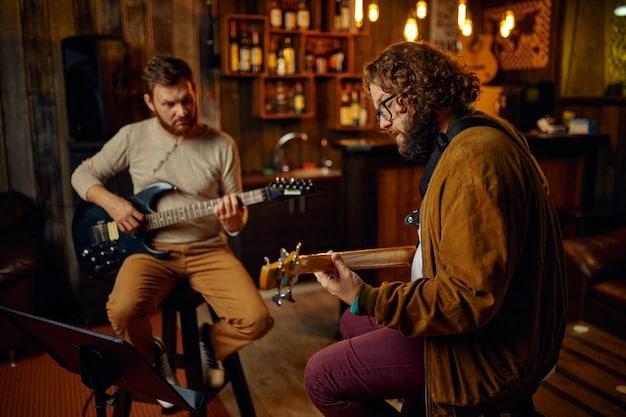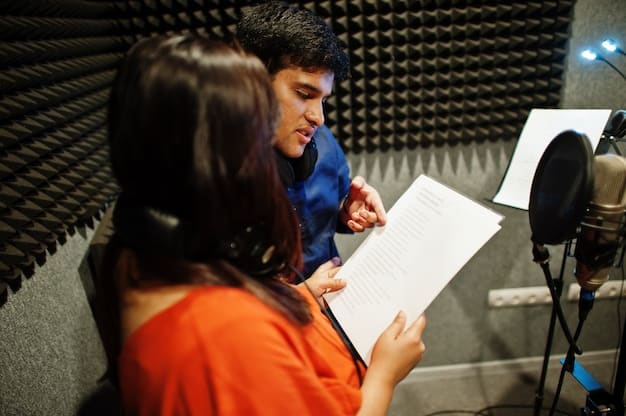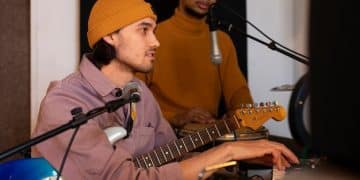Music Copyright Law for Emerging Artists: Protect Your Songs

Emerging artists need to understand music copyright law to protect their original work from infringement and avoid costly legal battles, ensuring they maintain control over their creative assets and income streams.
Navigating the music industry as an emerging artist can be exciting, but it’s also crucial to understand the legal landscape, particularly when it comes to copyright law. Emerging artists: understanding music copyright law – avoid costly mistakes and protect your work is essential for safeguarding your creative efforts and ensuring you receive proper credit and compensation for your music.
why music copyright matters for emerging artists
For emerging artists, understanding music copyright is not merely an option; it’s a necessity for protecting your artistic creations. Copyright law grants creators exclusive rights over their original works, allowing them to control how their music is used, distributed, and monetized.
Without a firm grasp of these laws, emerging artists risk losing control over their music, facing legal disputes, and missing out on potential revenue streams. Protecting your music is not just about legal compliance; it’s about securing your future as a musician.
Understanding Copyright Basics
Copyright law safeguards original musical works, including songs, compositions, and recordings. This protection extends to both unpublished and published works, providing artists with legal rights from the moment their music is created and fixed in a tangible form.
Copyright protection generally lasts for the life of the author plus 70 years. For works made for hire, the protection extends for 95 years from the year of its first publication or 120 years from the year of its creation, whichever expires first.
- Copyright automatically exists: From the moment your original song is written down or recorded, it is automatically protected by copyright law.
- Registration provides additional benefits: Registering your copyright with the U.S. Copyright Office provides additional legal protections and advantages if you need to enforce your rights in court.
- Copyright covers various elements: This includes the musical composition (lyrics and melody) and the sound recording (the actual recorded performance).
Understanding these basics is the first step for emerging artists to protect their music effectively. By recognizing the scope and duration of copyright protection, artists can make informed decisions about how to manage and monetize their work.

registering your music with the U.s. copyright office
Registering your music with the U.S. Copyright Office is a critical step in securing comprehensive protection for your original work. While copyright protection is automatically granted upon creation, registration provides significant advantages, particularly in the event of infringement.
By understanding the registration process and its benefits, emerging artists can proactively protect their music and enforce their rights effectively.
Benefits of Copyright Registration
Registering your copyright grants several key advantages, most notably the ability to file a lawsuit for infringement. Without registration, you cannot bring a copyright infringement claim in federal court. Additionally, registration establishes a public record of your claim of ownership, which can be crucial in disputes.
Another significant benefit is the potential to recover statutory damages and attorneys’ fees in an infringement lawsuit. If you register your work within three months of publication or before the infringement occurs, you are eligible for these additional remedies.
How to Register Your Copyright
The U.S. Copyright Office offers online registration through its website, which is typically the easiest and most efficient method. The process involves creating an account, completing the online application, and submitting a copy of your work.
You will need to provide information about the song’s title, the author(s), and the copyright claimant(s). You will also need to pay a registration fee, which varies depending on the type of work and the registration method.
- Prepare your work: Ensure you have a copy of your song or recording in a digital format ready to upload.
- Create an account: Visit the U.S. Copyright Office website and create an account to begin the registration process.
- Complete the application: Fill out the online application form, providing accurate information about your work.
- Pay the fee: Submit the required registration fee using a credit card or electronic check.
Registering your music is a proactive and essential step for emerging artists. By understanding the benefits and following the registration process, you can secure comprehensive protection for your creative endeavors.
navigating performance rights organizations (pros)
Performance Rights Organizations (PROs) play a vital role in the music industry by licensing public performances of copyrighted musical works and distributing royalties to songwriters and publishers. For emerging artists, affiliating with a PRO is essential for earning income from the public performance of their music.
Understanding the function of PROs and how they operate is crucial for emerging artists to maximize their earnings and protect their performance rights.
What are PROs and How They Work
PROs such as ASCAP, BMI, and SESAC monitor public performances of music in various venues, including radio broadcasts, television shows, streaming services, and live performances. They collect license fees from these venues and distribute the royalties to their members based on the number and type of performances.
By joining a PRO, artists grant the organization the right to license their music for public performances. In return, the PRO tracks these performances and distributes royalties accordingly.
Selecting the right PRO depends on your individual needs and career goals. Each PRO has its own fee structure, membership requirements, and distribution policies.
- Research each PRO: Understand their fee structures, membership requirements, and distribution policies.
- Consider your music genre: Some PROs may be more aligned with certain music genres.
- Evaluate their performance tracking: Ensure the PRO has effective systems for tracking public performances of your music.

Navigating PROs is essential for emerging artists to earn income from the public performance of their music. By understanding the function of PROs and selecting the right organization, artists can maximize their earnings and protect their performance rights effectively. Understanding these options will help you navigate this element of emerging artists: understanding music copyright law – avoid costly mistakes and protect your work.
sync licensing: opportunities for income
Synchronization licensing, commonly known as “sync” licensing, is a significant income source for songwriters and composers. It involves licensing a musical work to be used in synchronization with visual media, such as movies, television shows, commercials, and video games.
For emerging artists, sync licensing presents a valuable opportunity to gain exposure, generate revenue, and expand their reach to new audiences.
How Sync Licensing Works
When a music supervisor or production company wants to use a song in a film or television show, they must obtain a sync license from the copyright owner(s) of the musical work. This license grants them the right to synchronize the song with the visual media.
The fee for a sync license varies widely depending on factors such as the prominence of the song, the type of media, the duration of use, and the popularity of the artist. High-profile uses in major films or commercials can command significant fees, while smaller projects may have more limited budgets.
Tips for Emerging Artists to Pursue Sync Licensing
To increase your chances of landing sync licensing opportunities, focus on creating high-quality recordings and building relationships with music supervisors and licensing agencies. Also, ensure your music is properly registered with a PRO and that you have clear ownership of the copyright.
Networking at music industry events can provide valuable connections and exposure. Many music supervisors and licensing agents attend these events to discover new talent and music for their projects.
- Create high-quality recordings: Ensure your music is professionally recorded and mixed.
- Register with a PRO: Properly register your songs with a Performance Rights Organization.
- Build relationships: Network with music supervisors, licensing agents, and other industry professionals.
Sync licensing provides a significant opportunity for emerging artists to generate income, gain exposure, and expand their reach. By understanding how sync licensing works and taking proactive steps to pursue these opportunities, artists can enhance their careers and financial stability.
understanding fair use and transformative works
Fair use is a legal doctrine that allows limited use of copyrighted material without requiring permission from the copyright holder. It provides exceptions to copyright protection for purposes such as criticism, commentary, news reporting, teaching, scholarship, and research.
For emerging artists, understanding fair use and transformative works is important for both protecting their own copyright and avoiding infringement when using existing copyrighted material in their work.
The Four Factors of Fair Use:
Whether a particular use of copyrighted material qualifies as fair use depends on a case-by-case analysis of four factors outlined in the Copyright Act. These factors are:
- The purpose and character of the use, including whether such use is of a commercial nature or is for nonprofit educational purposes;
- The nature of the copyrighted work;
- The amount and substantiality of the portion used in relation to the copyrighted work as a whole; and
- The effect of the use upon the potential market for or value of the copyrighted work.
Transformative works are those that add new expression, meaning, or message to the original work. If the use is transformative, it is more likely to be considered fair use.
Creative Commons Licenses
Creative Commons (CC) licenses provide a flexible range of options for copyright holders to grant permissions for others to use their work. These licenses allow creators to specify the terms under which their work can be used, shared, and adapted.
Emerging artists can use CC licenses to share their work more openly while still retaining copyright protection. By choosing the appropriate CC license, artists can allow others to use their work for non-commercial purposes, create derivative works, or share it under the same terms (the ‘share-alike’ provision).
Practical Implications for Emerging Artists
Emerging artists should be cautious when using copyrighted material in their own work. Before incorporating any copyrighted material, consider whether the use qualifies as fair use. If not, seek permission from the copyright holder.
Understanding fair use and transformative works is crucial for emerging artists to navigate the complex landscape of copyright law. By respecting copyright and seeking appropriate permissions when necessary, artists can protect their creative endeavors and avoid legal disputes. Fair Use can be complicated, so it’s best to understand how to address this in emerging artists: understanding music copyright law – avoid costly mistakes and protect your work.
collaborations and co-writing agreements
Collaboration is a common practice in the music industry, where artists, songwriters, and producers work together to create new music. While collaboration can lead to exciting creative outcomes, it is essential to establish clear agreements regarding copyright ownership and revenue sharing.
For emerging artists, understanding collaborations and co-writing agreements is crucial for protecting their interests and avoiding disputes down the line.
Elements of a Co-Writing Agreement
A co-writing agreement is a legally binding contract that outlines the rights and responsibilities of each collaborator. This agreement should specify the ownership shares of the copyright, the division of royalties, and the decision-making process for licensing and other matters.
Key elements of a co-writing agreement include:
- Copyright ownership: Specify the percentage of copyright ownership for each collaborator.
- Royalty splits: Outline how royalties from sales, streaming, and performance will be divided.
- Credit and attribution: Ensure each collaborator receives proper credit for their contributions.
- Decision-making: Establish a process for making decisions regarding licensing, publishing, and other matters.
Protecting Your Interests in Collaborations
Before entering into a collaboration, have a frank and open discussion with your co-writers or collaborators about your expectations and goals. Be sure to put everything in writing and consult with an entertainment lawyer to ensure your interests are protected.
By understanding collaborations and co-writing agreements, emerging artists can protect their interests, avoid disputes, and foster positive and productive working relationships.
Collaboration in the music industry requires a clear understanding of co-writing agreements in emerging artists: understanding music copyright law – avoid costly mistakes and protect your work. These relationships can prove beneficial when they are structured properly.
| Key Point | Brief Description |
|---|---|
| 📝 Copyright Registration | Registering your music with the U.S. Copyright Office provides legal protection. |
| 🎤 Performance Rights Organizations | PROs license public performances and distribute royalties to songwriters. |
| 🎬 Sync Licensing | Sync licenses allow music to be used in visual media like movies and TV shows. |
| 🤝 Co-Writing Agreements | Establish clear agreements regarding copyright ownership in collaborations. |
Frequently Asked Questions
▼
Copyright law protects your original music from being used without your permission, helping you control how your work is monetized and credited. It ensures you can pursue legal action against infringement.
▼
You can register your music online through the U.S. Copyright Office website. Create an account, complete the application, upload a copy of your work, and pay the registration fee to finalize the process.
▼
A PRO licenses public performances of your music, collecting fees from venues and distributing royalties to you. Joining a PRO ensures you get paid when your music is played on the radio, TV, or in public venues.
▼
Sync licensing involves licensing your music for use in visual media like movies and TV shows. Build relationships with music supervisors, create high-quality recordings, and ensure you have clear copyright ownership to increase your chances.
▼
A co-writing agreement is a contract that outlines the rights and responsibilities of each collaborator in a songwriting project. It specifies copyright ownership, royalty splits, and decision-making processes to avoid disputes.
Conclusion
Understanding music copyright law is paramount for emerging artists aiming to protect their creative work and secure their financial future in the industry. By grasping the basics of copyright law, registering your music, navigating PROs, leveraging sync licensing opportunities, and establishing clear collaboration agreements, you can safeguard your artistic endeavors and build a successful and sustainable career in music.





